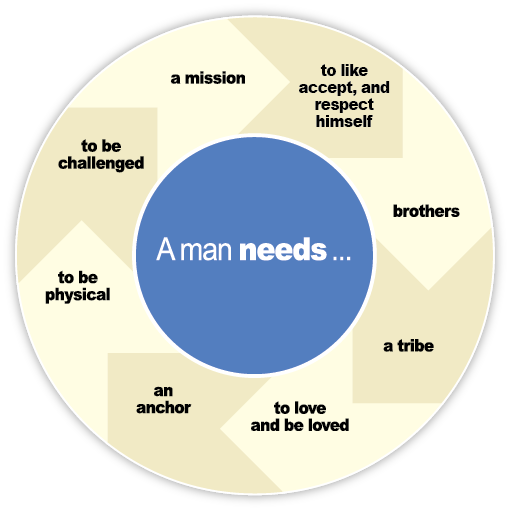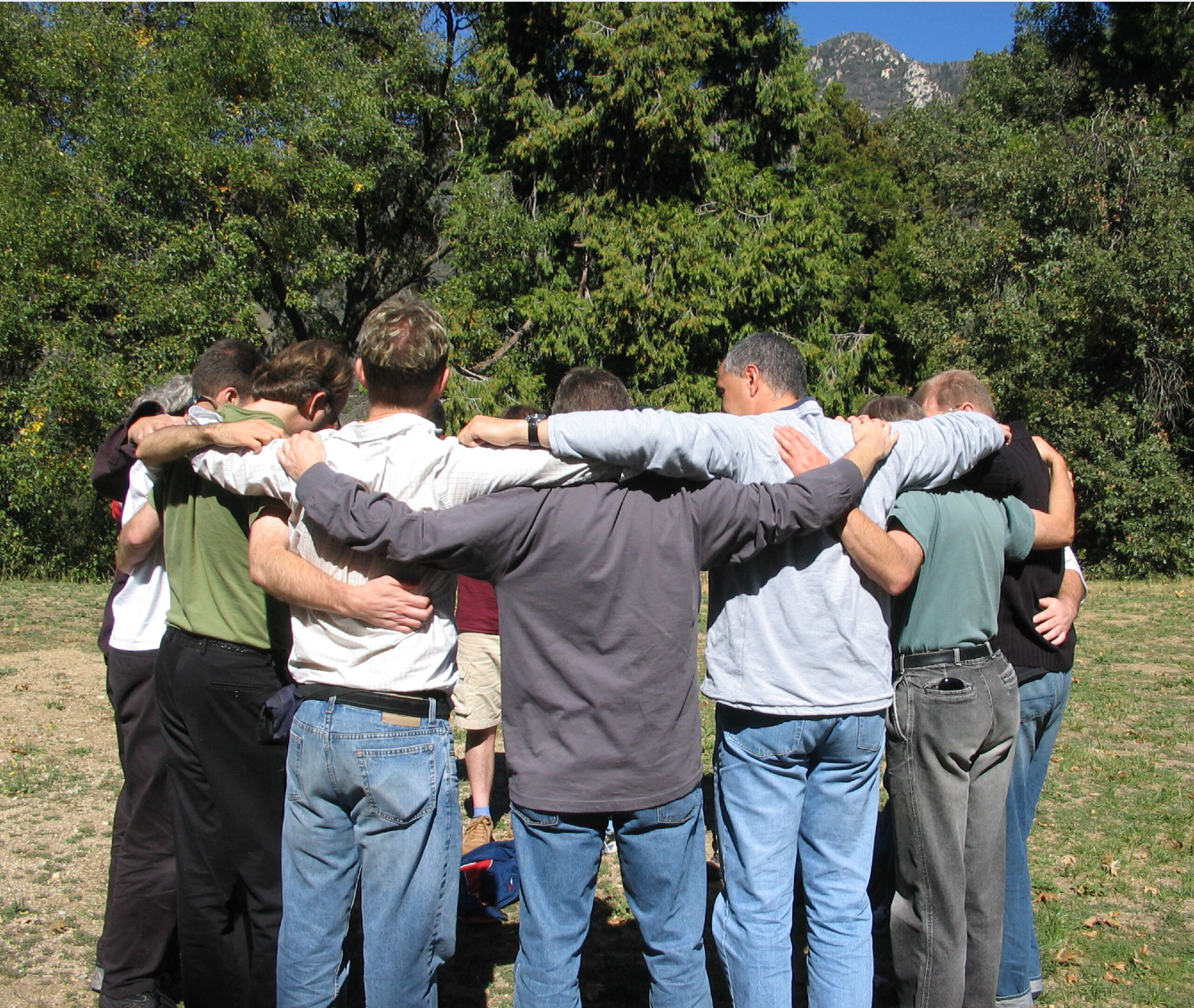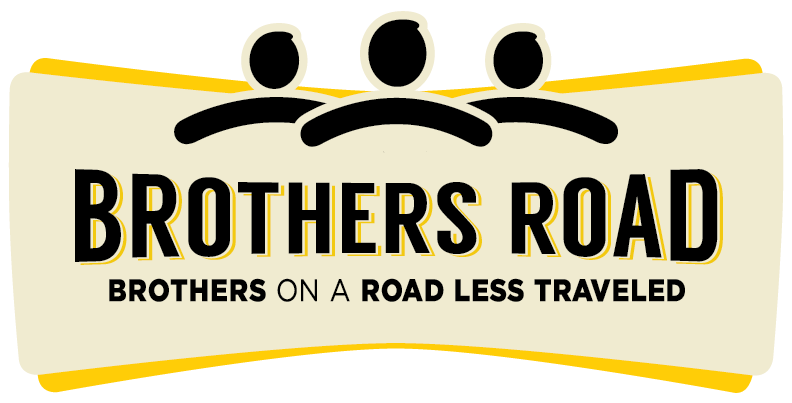Our Journey
We are on a journey of self-discovery to explore and address underlying issues and embrace our authentic masculinity. The core of this journey we call “M.A.N.S. Work.”
Get Support, Build Friendships
At its root, SSA is a relational, not sexual, issue. It can only be truly addressed in safe, platonic, supportive friendships and communities.
The core needs of any man include the need to:
- like, accept and respect himself
- have “brothers” (male peers, mentors and friends) who give him attention, acceptance and affection
- belong to a “tribe” or community where he belongs and feels included and wanted
- love and be loved. (In fact, love is the greatest human need!)
As men with SSA concerns, we feel these particular needs especially deeply.
If we are really going to dig into our underlying issues and embrace our authentic masculinity, we have no choice but to heal and grow in relationships, primarily with men, usually, and then secondarily with women.

Risk Being Vulnerable
To do this, we need to:
- Admit to ourselves that we can’t do this alone. We take a leap of faith and reach out and ask for help. We tell our story to a few carefully selected people and trust that they can hear it and still love and accept us. (See: Authenticity.)
- Find ways to relate to men as peers — neither better than us nor less than us — by finding at least a few common interests, activities or shared goals. We take the risk of building strong, trusting, personal bonds with other men. We develop multiple, meaningful, platonic friendships — not a “bromance” with one single best friend. (See: Masculinity.)
- Find or create safe spaces among safe people who are emotionally equipped to support us in doing deep inner work. (See: Authenticity.) This has to include reaching out proactively to include ourselves in meaningful male communities — without passively waiting for someone else to include us. (See:
- Masculinity. Establish mentoring relationships with men who have qualities that we admire and who take a personal interest in our growth. (See: Masculinity.)
If you want something you’ve never had, you’ve got to do something you’ve never done!
I struggled in silence for 20 years thinking I could change myself if I just had the right understanding and the right techniques. But it wasn’t until I came into the Brothers Road community and allowed myself to be loved — just as I am — that phenomenal changes started taking place in my life and in my interactions with others.
You walk into the room at Journey Into Manhood, and all of a sudden these men know more about you than people you’ve known your whole life know about you. And you know more about them, too.
To be able to connect so authentically, with nothing holding you back, it’s life-changing if you’ve been hiding something like same-sex attraction your whole life.
Get Support, Build Community
When a man who has been conflicted over and ashamed of his same-sex attractions finally finds an understanding, supportive community of men who share similar concerns and have similar values, he can suddenly feel like a new man — like he’s been giving a new life.
And that can be true, in many ways. To no longer have to walk such a difficult road alone, in secrecy, can be a life-changing breakthrough.

Reaching out may be the turning point you’ve been hoping and praying for all these years.
Build Deeply Meaningful Friendships
Shame, secrecy, fear of men, fear of rejection, not knowing how to fit in — all of these can be formidable barriers to building authentic, meaningful friendships with other men. Even if that’s what we really need more than anything else.
But growth doesn’t happen sitting comfortably in your familiar comfort zone. You can’t keep doing what you’ve always done and expect different results.
- In M.A.N.S. Work, the Masculinity principle teaches us to: Bond as brothers with other men in deeper, healthier, more meaningful ways than ever before.
- The Authenticity principle teaches: Our shame begins to collapse when we “get real” with a few trusted others who respond with acceptance and compassion.
- The Needs Fulfillment principle teaches: Especially vital are core needs for love and acceptance (“A man needs brothers”) and community and belonging (“A man needs a tribe”).
- And the Surrender principle teaches us to: Begin the difficult work of releasing our attachments to any harmful or unhealthy thoughts, beliefs, judgments, feelings, impulses, behaviors, habits, and relationships. And that’s especially true about any mental barriers we may have placed between ourselves and the possibilities for meaningful friendships with men.

Over time, you’ll likely notice that when you “friendship tank” is full, you’ll be much less tempted to fall into depression, self-pity or problematic sexual behaviors. Because that’s probably what you really needed all along.
How do you go about it?
If you’ve taken any of steps to get support and build community that we described above, you’ve got a big head start. From there:
Consider Also…
- Most male friendships are based on:
- shared interests
- joint activities
- shared purposes (pursuing common goals)
So try focusing on initiating activities first, then heart-to-heart conversations. Men tend to want to act, not just talk. But they will often open up within the context of a shared activity.
Also, you’ll likely need to build different friendships around different activities and interests, at least originally. Don’t expect one man to meet all your needs.
- You’ll benefit most from different kinds of friendships:

- Brothers. Friends you can connect with in deep, meaningful, platonic ways. In this kind of friendship, a man experiences brotherhood.
- A “tribe” or community working toward a shared purpose. Here, a man experiences peer-group belonging.
- A mentor. A father figure, older brother figure, or “elder” who guides, encourages and shares his wisdom. Here, a man experiences father-son healing.
- Eventually, someone to mentor. Someone to share your own wisdom and experience and pass it on to a younger generation. Here, a man experiences father-son healing, but from the perspective of the stronger, healthier father.
- Emotionally, the least risky friendships to develop initially may be with other men who likewise experience unwanted same-sex attractions and whose intention is to minimize them or at least not act on them. A bond over shared life experiences can easily develop. You don’t have to fear rejection over your SSA.
Here, you may first learn to trust other men, before moving on to initiate potentially “scarier” friendships with men who don’t experience SSA. (Caution: Friendships with other SSA men can more easily develop sexual or romantic undertones. - Friendships with heterosexual men may be a bit more threatening, at first, but also have the potential to be more healing. Feeling accepted and affirmed by men whose life struggles don’t include SSA can be a turning point in aa SSA man’s self-image and self-confidence.
- Be willing to take risks. Sometimes you’ll be told “no,” and sometimes you’ll be told “yes.” Everyone is in charge of their own boundaries. Be grateful for their honesty. (No one wants to be a “pity friend,” after all.) Don’t be discouraged. Keep reaching out.
- Expect to put more energy into initiating and maintaining good friendships than your friends do. Your need for friendships, at this time of your life, is probably greater than theirs right now. Whoever wants the friendship more will have to do more of the work. Try not to take it as a slight.
- Expect to lead out on being vulnerable and authentic, also. A lot of men have been taught to guard their private thoughts and struggle, but they may be hungry to do exactly that. You willingness to open up is an invitation to them to do likewise. Some will accept that invitation. Others may not.
- Don’t expect to build new friendships at warp speed. Nurturing a friendship is like nurturing a garden. It takes some attention and patience.
- Don’t give up. Meaningful male friendships are a need, not a want. Just keep at it until you have all the friendship you need.
Our Stories
I searched and prayed for many years to find a support network, a brotherhood of men who shared my struggle. Alone and isolated, I knew that there had to be other men who were in the same boat — sexually attracted to the same gender but choosing not to act upon it. I felt lost and confused in my search, fearful that I might just be alone in my desperation.
Finding a support network in my local community and through Brothers Road has been an enormous blessing. I now know that I do not struggle alone, that there are many men who walk in my shoes and who are there for support, encouragement, accountability and friendship.
How could I rely on heterosexual men to be there for me, to be my friends, to meet my needs for male companionship and affirmation? I had always believed the only men who wanted anything to do with other men were gay.
My counselor helped me open my mind and heart to the possibility of finding heterosexual men whom I could turn to for help and support throughout my week. It was terrifying, but I approached Martin, a man at my church about eight years older than I, and asked him to be a spiritual mentor to me. He readily agreed.
He knew nothing about homosexuality, but he knew about God, and he knew about pain, and he was more than willing to be there for me. I talked with him at least weekly, sometimes several times a week, baring my soul. I called him when I was tempted to act out. I called him when I stumbled, and he helped lift me back up.
The brotherhood of the Journey Into Manhood community has been very important to me. Loneliness and isolation have been all too prominent in my life, causing shame and unhealthy behaviors. Belonging to a community of men who accept me and affirm me increases my self-acceptance and diffuses my shame, making me less in need of unhealthy ‘self-medicating’ methods of escape, such as porn and fantasy.
Support was critical for me. I used to be incredibly isolated. When I learned that other men struggled in the same ways I did, that greatly reduced my shame. I now have a band of brothers with whom I can share anything. I judge there are very few men on the planet who can truthfully say that. Same-sex attraction has proved a blessing beyond my wildest dreams. A sexual feeling toward another man is simply a signal to me — a signal that I need deep platonic connection with the world of men. And I now know that deep level of connection is out there. It’s available to me.
I needed to realize I could not do this on my own. I simply did not know how. I needed the guidance and help of others that God has placed into my life, ones who have learned how to overcome and have overcome various obstacles in their own lives that I then recognized in my own life.
One of the most important things I learned in the beginning of my men’s work was I didn’t have to do it alone. It was in direct contradiction to all I’d come to believe. And old habits die hard. But connection and support were so vital and valuable. I came home from Journey Into Manhood and co-created a group immediately. Those men became my teachers and my friends. We learned from one another, and possibly more importantly, we reminded each other again and again that we were not alone.
The support of fellow brothers is amazing! We meet a couple times a month for encouragement and I am free to call many of them any time of the day or night. I can’t imagine life without them.
Before I started my journey I had zero close male friends in my life. I was scared to make any contact. Now I see that other brothers can help me become who I want to be.
During my Journey Into Manhood weekend I learned that I am not alone. I could talk and share my innermost thoughts with brothers, and I have experienced a level of openness and understanding I have never found before. I am now part of a worldwide brotherhood of men I can reach out to if I need support. And I can be a support to brothers who reach out to me. As a result, there is growth and lifelong development unlike anything I had experienced before.
Tools & Resources
Books
- The Art of Friendship: 70 Simple Rules for Making Meaningful Connections
- A Bigger World Yet: Faith, Brotherhood & Same-Sex Needs *Especially recommended
- A Circle of Men: The Original Manual for Men’s Support Groups
- Breaking the Male Code: Unlocking the Power of Friendship
- Buddy System: Understanding Male Friendships
- The Company You Keep: The Transforming Power of Male Friendship
- Circles of Men: Supporting Men in Finding Greater Meaning and Purpose in their Lives; A Counter-Intuitive Approach to Creating Men’s Groups
- The Friendship Factor
- Samson and the Pirate Monks: Calling Men to Authentic Brotherhood *Especially recommended
